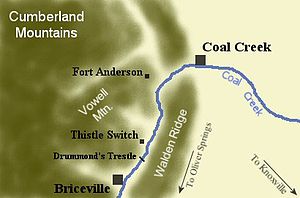| Coal Creek War | |||
|---|---|---|---|
| Part of the Coal Wars | |||
 Key locations during the Coal Creek War | |||
| Date | April 1891 – August 1892 | ||
| Location | |||
| Goals | End convict leasing by coal companies | ||
| Resulted in | State ending convict leasing in 1896 | ||
| Parties | |||
| |||
| Lead figures | |||
| |||
| Casualties and losses | |||
| |||
The Coal Creek War was an early 1890s armed labor uprising in the southeastern United States that took place primarily in Anderson County, Tennessee. This labor conflict ignited during 1891 when coal mine owners in the Coal Creek watershed began to remove and replace their company-employed, private coal miners then on the payroll with convict laborers leased out by the Tennessee state prison system.
These former wage-earning Coal Creek coal miners repeatedly attacked and burned both state prison stockades and mine properties, all while releasing hundreds of the state convict laborers from their bondage to the mine companies. Many of these same Coal Creek coal miners were wounded or killed in small-arms skirmishes during the Coal Creek War, along with dozens of Tennessee state militiamen.
One historian describes the Coal Creek War as "one of the most dramatic and significant episodes in all American labor history."[1]
The Coal Creek War was part of a greater labor struggle across Tennessee that was launched against the state government's controversial convict leasing system, which allowed the state prison system to lease convict labor to mining companies (and other business enterprises) with the effect of suppressing employee wages in the open market across the state. The outbreak of this labor conflict touched off a partisan media firestorm between the miners' supporters and detractors and brought the issue of convict leasing to the public debate.
Although the Coal Creek War essentially ended with the arrests of hundreds of former company coal miners during 1892, the adverse exposure that this state conflict with private labor generated nationwide led to the downfall of Governor John P. Buchanan and forced the Tennessee General Assembly to reconsider its state convict labor-leasing system.[2] The Tennessee state government later refused to renew its convict labor-lease contracts with private businesses upon the arrival at the 1896 expiration dates, making Tennessee one of the first states within the southern United States to end this controversial practice.[1]
- ^ a b Perry Cotham, Toil, Turmoil & Triumph: A Portrait of the Tennessee Labor Movement (Franklin, Tenn.: Hillsboro Press, 1995), pp. 56-80.
- ^ James B. Jones, Convict Lease Wars. Tennessee Encyclopedia of History and Culture, 2002. Retrieved: 10 May 2009.